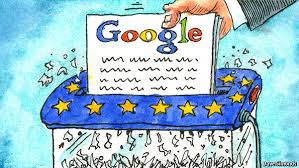In this blog post, Sayan Mukherjee, a student of the University of Calcutta, who is currently pursuing a Diploma in Entrepreneurship Administration and Business Laws from NUJS, Kolkata, discusses the Google Spain Sl Vs. Mario Costeja González case law that led to an important ruling on the Right to Be Forgotten.
Today’s tech savvy world is an awareness network which has widened the developing necessity of International Human Rights Enforcement. But this technology is also known for violating human rights at each level. A major area of debate in this regard lies under the controversial ‘Right to be Forgotten’ ruling by the CJEU. We shall go into the details of this case to understand the new right envisaged herein.
Statement Of Facts
- That in 1998, two incidents of forced sale of properties arising from social security debts was published in the printed edition of Spanish La Vanguardia newspaper. This was done by order of the Spanish Ministry of Labour and Social Affairs. Later on, a version of the edition was made available on the web. Mario Costeja González was one such property owner who was named in the announcements.

- That in November 2009, Costeja complained to the newspaper authorities that when he entered his name in the Google search engine, it led to the irrelevant announcements. But, the newspaper replied that since the publication had been made as per the order of the Spanish Ministry of Labour and Social Affairs, erasing his data was inappropriate.
- That in February 2010, Costeja contacted Google Spain, asking removal of the links to the announcements. But, Google Spain viewed that Google Inc. (Reg. office: California, United States) was the responsible body and forwarded the request accordingly. Subsequently, aggrieved Costeja filed a complaint with the Agencia Española de Protección de Datos, AEPD (Spanish Agency of data protection) seeking removal of the data and links to the date by both Google Spain / Google Inc. and the newspaper respectively.

- That on 30 July 2010, the APED rejected the complaint against the newspaper but upheld the subsequent complaint and called upon Google Spain and Google Inc., to remove the links complained of, making access to the data impossible.
- That subsequently, Google Spain and Google Inc. appealed against the decision before the Audiencia Nacional(National High Court of Spain).
- That on 27 February 2012, Audiencia Nacional (Spain) requested CJEU for a preliminary ruling under Article 267 TFEU and stayed the proceedings pending before it.
- That the issues raised before the CJEU were new points of law and thus, the Court sought the opinion of the Advocate General. On 25 June 2013, Advocate General Niilo Jääskinengave his opinion, after which the Judgement was passed
Issues Raised
- Whether or not Google Spain, a subsidiary of Google Inc. was responsible for the search engine?
- Whether or not Google was within the scope of the EU Directive 95/46/EC and related obligations?
- Whether or not Google Inc. or Google Spain could be regarded as a data controller?
- Whether or not the data subject (Costeja) has the right to erasure of lawfully published materials?
Arguments Advanced
On Behalf Of Google:
Issue 1: Whether or not Google Spain, a subsidiary of Google Inc. was responsible for the search engine?
Google Spain viewed that it was just a subsidiary of the holding company Google Inc., thus forwarded Costeja’s complaint to Google Inc.
Issue 2: Whether or not Google was within the scope of the EU Directive 95/46/EC and related obligations?
Google Inc. exclaimed that their registered office was at California, United States. Thus they argued that Google Inc. was not within the scope of EU Directive 95/46/EC.
Issue 3: Whether or not Google Inc. or Google Spain could be regarded as a data controller?
Google viewed that in no way it can be considered as a data controller because there was no processing of personal data carried out by them in Spain.
Issue 4: Whether or not the data subject (Costeja) has the right to erasure of lawfully published materials?
Google stated that in any event, Mr. Mario Costeja cannot be allowed to erasure a lawful data published on a direction by the Spanish Ministry of Labour and Social Affairs.
On Behalf Of Aepd And Costeja:
Issue 1: Whether or not Google Spain, a subsidiary of Google Inc. was responsible for the search engine?
AEPD claimed that Google Spain and Google Inc. must be considered as a single economic unit. This is because the subsidiary promoted and sold advertising spaces authorized by its parent company. This is also equivalent to data processing.
Issue 2: Whether or not Google was within the scope of the EU Directive 95/46/EC and related obligations?
AEPD observed that the directive predates the Google era (1995). However, the new replacement in late 2014 by the General Data Protection Regulation sets the guideline clearly. Thus AEPD exclaimed that Google’s business model brings it within the scope of EU Directive 95/46/EC.
Issue 3: Whether or not Google Inc. or Google Spain could be regarded as a data controller?
AEPD held that Google must be regarded as a data controller as per literal interpretation of Article 2(b) of the directive.
Issue 4: Whether or not the data subject (Costeja) has the right to erasure of lawfully published materials?
Mr. Costeja reasoned that the forced sale had concluded years before. Therefore the links on the search engine supplied irrelevant data which in turn degraded his economic stature as the debt was subsequently paid by him. Thus this restricts development of his life in an autonomous way. Thus so-called Right to be forgotten was prayed by him.
The Holding
The Court of Justice of the European Union on 13th May 2014 pronounced a Landmark judgment, upholding a right to be forgotten.
Issue 1: Whether or not Google Spain, a subsidiary of Google Inc. was responsible for the search engine?
The Court observed that Google Spain being a subsidiary of Google Inc. and is working on Spanish territory is, therefore, an ‘establishment’ within the meaning of the Directive. The Court rejecting Google Inc.’s argument held that promotion and selling of advertising space by Google Spain was sufficient to constitute data processing within the scope of the Directive.
Issue 2: Whether or not Google was within the scope of the EU Directive 95/46/EC and related obligations?
The Court held that both Google Inc. and Google Spain were within the scope of the Directive and pointed out some related obligations and duties.
Article 7(e) and 7(f) of the Directive- legitimacy of processing
Article 14(a) of the Directive- the Court upheld the data subject’s right to object at any time on compelling legitimate grounds relating to his personal data processing unless otherwise provided by national legislature.
Article 7 of Charter of Fundamental Rights of the European Union– respect for private and family life.
Article 8 of Charter of Fundamental Rights of the European Union– protection of personal data.
 Issue 3: Whether or not Google Inc. or Google Spain could be regarded as a data controller?
Issue 3: Whether or not Google Inc. or Google Spain could be regarded as a data controller?
The Court adopted a literal interpretation of Article 2(b) of the Directive rejecting Google’s submission supported by the Advocate General’s opinion. It held that Google should be regarded as a data controller within the scope of the Directiverelying upon Bodil Lindqvist v Åklagarkammaren i Jönköping (2003)[1] the decision by the ECJ.
Issue 4: Whether or not the data subject (Costeja) has the right to erasure of lawfully published materials?
Regarding the question of the right to be forgotten, the Court held that the processing of data which is “inadequate, irrelevant or excessive” is incompatible with the provisions of article 6(1)(e) to (f) of the Directive and the related information and links in the list of results must be erased.
Further, Article 12(b) of the Directive- recognizes the Right to access the data and allows a request to the erasure of data. However, such request should be made directly to the controller. If further aggrieved, the data subject may direct the request to the judicial authority, which further investigates into the matter and directs the controller to act accordingly.
Therefore CJEU held that an Internet search engine operator is responsible for the processing it carries out of personal information on web pages published by third parties.
Conclusion
The landmark judgment of the so-called Right to be Forgotten has widened the scope of Universal International Law. This unique, relatively recent born right is now being claimed throughout the world. Instances of its recognition are found in several country’s precedents like that of Argentina[2], United States[3], South Korea[4], as well as in India.
Recently, at Delhi High Court (April 2016) the issue was debated in a case where a Delhi banker requested to have his personal details removed from search results following a marital dispute. Here, as the dispute being settled, the principle of the right to be forgotten rightly applies. However, the Court has asked for a reply from Google and other companies by September 19, upon which the Court will continue further investigation.
It’s belief that the rationale of the ‘Right to be Forgotten’ will inevitably find itself as a globally accepted International Human Right in the coming days.
References:
[1]Case no: Case C-101/01
[2] “La Justicia Argentina Sobreseyó an Adriana Noreña, Directora General de Google.” Infotechnology.com. 2012-09-21. Retrieved 2014-08-09.
[3]http://www.adweek.com/prnewser/hey-google-9-in-10-americans-want-the-right-to-be-forgotten/111218
[4]http://www.bna.com/south-korea-releases-n57982070847/
 Serato DJ Crack 2025Serato DJ PRO Crack
Serato DJ Crack 2025Serato DJ PRO Crack










 Allow notifications
Allow notifications


